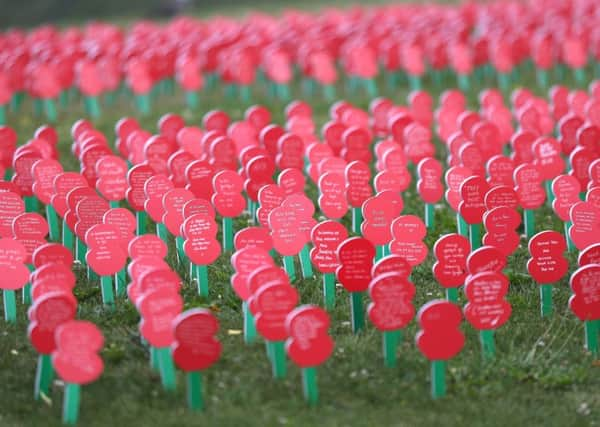Leah Swain: Remember and learn from those who were in war


Passchendaele and the First World War in general are reluctantly recalled as periods of shame, slaughter and unnecessary sacrifice in our history where young men – the ‘flower of a generation’ – were sent to their deaths in their thousands. The numbers are unimaginable – 90,000 bodies unidentified; 42,000 never recovered – which mean it can be easy to forget the individuals who were at the heart of the battle. Every one of them had a voice, opinions and dreams of their own.
But 100 years on, when there are no survivors and the conflict has passed out of living memory, how do we make such an important date in our history relatable to our modern world? Why remember this battle and the men who fought and died above other military conflicts or anniversaries of civilian tragedies?
Advertisement
Hide AdAdvertisement
Hide AdWhile social media over the last 10 years has given us a new platform to share our commemorative thoughts with thousands of people, it also makes it hard to be heard in the midst of so many voices clamouring to be heard. In the midst of this, and coupled with the dramatic movement of time and technology, important historical events are at risk of being forgotten and – for lack of a better phrase – relegated to the history books forever.
Yet in our rapidly ageing population, it is becoming more important than ever to tie people and communities together across generations, to allow our past to meet our present so that we may create a future which is inclusive and valuing of all. Recognising the men and women who fought at Passchendaele and in other conflicts is a key part of this. Appreciating and being able to connect with war-torn soldiers means we are better able to care for them in times of peace.
When veterans were demobbed and came home from war in 1918-19, they faced many of the same issues our modern veterans face today. Unemployment, addiction, mental and physical wounds, stigma and misunderstanding were rife. Many veterans make the transition back to civilian life successfully and unaided, but 100 years on from Passchendaele we still risk letting down those who do not.
Service provision for veterans in 1917 was clearly different to today. Although the First World War saw the likes of SSAFA and St Dunstan’s (now known as Blind Veterans UK) grow in profile and become household names, for the majority of the survivors of Flanders Fields their needs would not be well met on their return home.
Advertisement
Hide AdAdvertisement
Hide AdWe are a much more open and equal society than we were back then, when veterans returning with horrible disfigurements, disabilities and debilitating trauma would have found it difficult to lead a normal life again. Many faced homelessness and ostracisation as Britain sought to forget its still-open wounds, remembering those who made the ultimate sacrifice, but often neglecting those who were left behind.
Today, there are hundreds of services and charities for veterans to tap into, epitomised by the recently-launched ‘Veterans’ Gateway’ bringing them all together. It is our responsibility to care for the men and women who have served our country, no matter what their age, and ensure they do not face the same hardships and neglect of a century ago.
Locally, Ex-Forces Support North Yorkshire aims to support our older veterans – many of whom fought in conflicts we are starting to lose from our living memories. We will be providing practical support, making homes warmer, getting veterans out and about more, helping them learn new skills and feel part of a supportive community. Just as importantly we will be ensuring that our few surviving Second World War veterans, as well as those from more recent conflicts such as the Falklands and Northern Ireland, have the chance to pass on their stories and share their memories while they still can. Human experience is the common link across all generations that cannot be broken.
On the centenary of the Battle of Passchendaele, we ask you to take note of the past and make time to remember and learn from those who lived through war. Talk to your grandparents, your neighbours, your families and friends and find out if any of them have a connection to the First World War or any war since. Let us not forget the people of that atrocious battle. We owe it to the veterans of 100 years ago and the many others since.
Leah Swain is Chief Executive of Community First Yorkshire